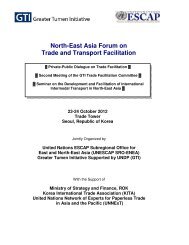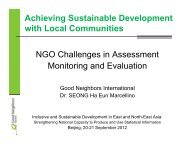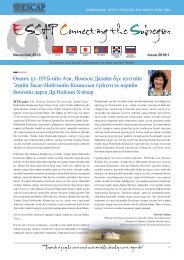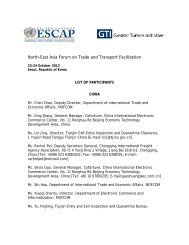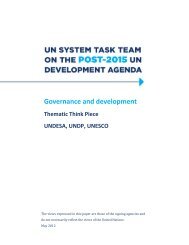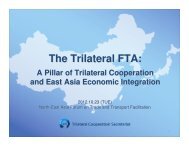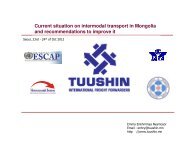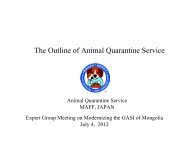Full Report - Subregional Office for East and North-East Asia - escap
Full Report - Subregional Office for East and North-East Asia - escap
Full Report - Subregional Office for East and North-East Asia - escap
You also want an ePaper? Increase the reach of your titles
YUMPU automatically turns print PDFs into web optimized ePapers that Google loves.
MACROECONOMIC PERFORMANCE AND POLICY CHALLENGES AT THE SUBREGIONAL LEVEL CHAPTER 2<br />
remittances cannot help in the provision of public<br />
goods, such as roads, water supply <strong>and</strong> power supply,<br />
as well as education <strong>and</strong> health-care services. Aid<br />
will also be important in helping the countries in<br />
dealing with the impacts of climate change.<br />
Despite their small size <strong>and</strong> remote location, Pacific<br />
isl<strong>and</strong> developing economies have growth potential<br />
but unlocking this requires the development of<br />
appropriate institutional environments, including<br />
re<strong>for</strong>ming the investment <strong>and</strong> communication<br />
technologies sector (ADB, 2012c). For example,<br />
Fiji, Samoa, Tonga, Solomon Isl<strong>and</strong>s <strong>and</strong> Vanuatu<br />
have introduced competition among mobile phone<br />
service providers, leading to substantial reductions<br />
in costs. Thus economic re<strong>for</strong>ms that lead to<br />
productivity increases, such as opening internal<br />
telecommunications <strong>and</strong> airline services <strong>for</strong><br />
competition, opening trade <strong>and</strong> investment channels<br />
<strong>and</strong> improving education <strong>and</strong> training, become even<br />
more critical <strong>for</strong> these small isl<strong>and</strong> economies if they<br />
are to exploit fully their growth potential.<br />
For the Pacific isl<strong>and</strong> economies, the effects of<br />
climate change <strong>and</strong> natural disasters are well known.<br />
For some of them, the implications are serious as<br />
they not only affect their short-term growth <strong>and</strong><br />
development prospects but could threaten their very<br />
existence if predictions of a rise in sea levels are<br />
borne out. A policy challenge <strong>for</strong> them is to focus<br />
on adapting to climate change <strong>and</strong> reducing their<br />
vulnerability to its effects, rather than on trying<br />
to mitigate it. However, the resources available to<br />
these economies to implement national adaptation<br />
programmes are scarce. It is now accepted that,<br />
<strong>for</strong> the Pacific isl<strong>and</strong>s developing economies with<br />
sufficient resources <strong>and</strong> technology transfer, adapting<br />
to climate change can be turned into an opportunity<br />
to create a new approach to development based<br />
on sustainability. Applying improved agricultural<br />
practices, adopting clean technologies, enhancing<br />
energy efficiency <strong>and</strong> making modern <strong>and</strong> clean<br />
energy available to the poor would help to<br />
simultaneously fight climate change <strong>and</strong> promote<br />
sustainable development in these countries.<br />
To deal with some of the above challenges, Pacific<br />
isl<strong>and</strong> developing economies need to strengthen<br />
cooperation among themselves. They are part of<br />
various regional organizations <strong>and</strong> discuss many<br />
issues of interest. However, the achievement of<br />
better <strong>and</strong> deeper regional integration would be<br />
in the long-term interest of these economies.<br />
Regional cooperation will enable them to reduce<br />
the cost of doing business <strong>and</strong> improve public<br />
services. These economies are strongly linked to<br />
the neighbouring major economies of Australia <strong>and</strong><br />
New Zeal<strong>and</strong>. Some bigger countries, such as Fiji,<br />
Papua New Guinea <strong>and</strong> Solomon Isl<strong>and</strong>s, have<br />
undertaken several initiatives <strong>for</strong> enhancing trade<br />
<strong>and</strong> investment links with their <strong>Asia</strong>n neighbours.<br />
Papua New Guinea is currently a member of <strong>Asia</strong>-<br />
Pacific Economic Cooperation <strong>and</strong> has observer<br />
status in the Association of Southeast <strong>Asia</strong>n Nations<br />
(ASEAN). Papua New Guinea’s exports to China,<br />
<strong>for</strong> example, increased from $122 million in 2001<br />
to $817 million in 2011 on the back of increasing<br />
Chinese dem<strong>and</strong> <strong>for</strong> Papua New Guinea’s petroleum<br />
products. Meanwhile the exports of Solomon Isl<strong>and</strong>s<br />
to China, dominated by timber logs, reached $348.4<br />
million in 2011. Many countries also import at least<br />
10% of their total imports from China. Infrastructure<br />
investment in many of these economies has been<br />
bolstered by funding from the Government of China.<br />
Trade <strong>and</strong> investment linkages between Pacific<br />
isl<strong>and</strong> developing economies <strong>and</strong> <strong>Asia</strong> are likely<br />
to continue to exp<strong>and</strong> due to low transportation<br />
costs. However, their long-term economic prospects<br />
will depend more heavily on their capacity to seize<br />
opportunities in a changing global l<strong>and</strong>scape.<br />
Australia <strong>and</strong> New Zeal<strong>and</strong><br />
Growth per<strong>for</strong>mance improved steadily<br />
In Australia, GDP growth accelerated to 3.6% in<br />
2012 from 2.5% in 2011 when the country suffered<br />
from severe floods (see figure 2.10). Total fixed<br />
investment growth surged to a multi-year high in<br />
mid-2012 on stellar resource investment that benefited<br />
from high commodity dem<strong>and</strong> from <strong>Asia</strong>. However,<br />
103



